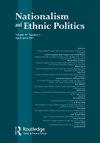欧洲议会的支持:对西藏自决要求的影响
IF 1.1
Q3 ETHNIC STUDIES
引用次数: 1
摘要
摘要本文采用文献分析的方法,考察了欧洲议会支持国际社会承认西藏民族自决的影响。迫于国内外的各种压力,西藏人已经把他们的要求从独立转向自治。欧洲议会支持这一要求,并敦促中国政府通过自治和自治承认民族自决。在此背景下,本文探讨欧洲议会的支持对国际社会承认西藏人的自决权有何影响?它认为,欧洲议会的支持进一步阻碍了对西藏民族自决的承认。中国政府将欧洲议会的支持解释为违反主权准则,集中力量阻止国际社会对西藏民族主义的支持,而欧盟则发现,由于其经济和战略利益,很难与中国的努力相抗衡。它没有坚持自己的议会对通过自治实现民族自决的支持,也没有将西藏民族主义纳入其人权议程。它已经开始采取一种不涉及民族主义主张的普遍人权方法,并为中国政府忽视民族主义要求准备了一个宽松的国际环境。本文章由计算机程序翻译,如有差异,请以英文原文为准。
Support of the European Parliament: Impact on Tibetan Claims to Self-Determination
Abstract Taking document analysis as its method, this article examines the impact of the European Parliament's (EP) support for the international recognition of Tibetan claims to self-determination. Conceding to various national and international pressures, the Tibetans have switched their demand from independence to autonomy. The EP has supported this demand and urged the Chinese government to recognize self-determination through autonomy and self-government. Against this background, this article examines - What is the impact of the EP’s support on the international recognition of the Tibetans’ right to self-determination? It argues that the EP’s support has further obstructed the recognition of the Tibetans’ self-determination. Interpreting the EP’s support as a violation of sovereign norms, the Chinese state has concentrated its efforts to prevent international support for Tibetan nationalism, and the EU is finding it difficult to contest the Chinese efforts due to its economic and strategic interests. It has not stood by its own parliament’s endorsement of self-determination through autonomy, nor has it made Tibetan nationalism a part of its human rights agenda. It has begun to adopt a universal human rights approach that does not address nationalist claims and prepares a permissive international environment for the Chinese government to ignore nationalist demands.
求助全文
通过发布文献求助,成功后即可免费获取论文全文。
去求助
来源期刊

Nationalism and Ethnic Politics
ETHNIC STUDIES-
CiteScore
1.30
自引率
0.00%
发文量
30
期刊介绍:
Nationalism & Ethnic Politics explores the varied political aspects of nationalism and ethnicity in order to develop more constructive inter-group relations. The journal publishes case studies and comparative and theoretical analyses. It deals with pluralism, ethno-nationalism, irredentism, separatism, and related phenomena, and examines processes and theories of ethnic identity formation, mobilization, conflict and accommodation in the context of political development and "nation-building". The journal compares and contrasts state and community claims, and deal with such factors as citizenship, race, religion, economic development, immigration, language, and the international environment.
 求助内容:
求助内容: 应助结果提醒方式:
应助结果提醒方式:


